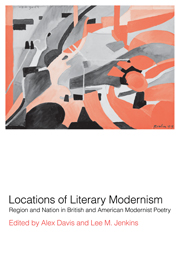Book contents
- Frontmatter
- Contents
- Notes on contributors
- Preface
- INTRODUCTION
- PART ONE OBSTINATE ISLES: THE ANGLO-CELTIC ARCHIPELAGO
- 1 MacDiarmid in Montrose
- 2 Bunting and Welsh
- 3 Antithesis of place in the poetry and life of David Jones
- 4 ‘Shut, too, in a tower of words’: Dylan Thomas' modernism
- 5 ‘Literally, for this’: metonymies of national identity in Edward Thomas, Yeats and Auden
- 6 Reactions from their burg: Irish modernist poets of the 1930s
- PART TWO AN AMERICAN PLACE
- Notes
- Index
4 - ‘Shut, too, in a tower of words’: Dylan Thomas' modernism
Published online by Cambridge University Press: 06 July 2010
- Frontmatter
- Contents
- Notes on contributors
- Preface
- INTRODUCTION
- PART ONE OBSTINATE ISLES: THE ANGLO-CELTIC ARCHIPELAGO
- 1 MacDiarmid in Montrose
- 2 Bunting and Welsh
- 3 Antithesis of place in the poetry and life of David Jones
- 4 ‘Shut, too, in a tower of words’: Dylan Thomas' modernism
- 5 ‘Literally, for this’: metonymies of national identity in Edward Thomas, Yeats and Auden
- 6 Reactions from their burg: Irish modernist poets of the 1930s
- PART TWO AN AMERICAN PLACE
- Notes
- Index
Summary
I never thought that localities meant so much, nor the genius of places, nor anything like that.
(Dylan Thomas)In one of the more bizarre asides in ‘The Function of Criticism’, an essay which has come to look increasingly radical the more the notion of a unitary modernism is revised, T. S. Eliot observed that ‘the possessors of the inner voice ride ten in a compartment to a football match at Swansea, listening to the inner voice which breathes the eternal message of vanity, fear and lust … It is a voice to which, for convenience, we may give a name: and the name I suggest is Whiggery’. The claim is evidence of Eliot's rightward progression in the 1920s, a coincidental seizing on the birthplace of Dylan Thomas as a location for irredeemable provincialism. For Eliot, having Vetch Field rather than Litde Gidding as a destination is a sure sign of the plebeian ‘inner voice’; Swansea equals Dissent, industry, philistinism and possibly also internal British difference, a would–be insider's put–down to distract from Eliot's self–fashioning as Anglican, classicist and monarchist. Yet the slur cuts both ways, and can equally be said to furnish a starting–point for a consideration of Thomas' poetry and its relationship to modernist precursors like Eliot himself.
- Type
- Chapter
- Information
- Locations of Literary ModernismRegion and Nation in British and American Modernist Poetry, pp. 89 - 112Publisher: Cambridge University PressPrint publication year: 2000
- 1
- Cited by



